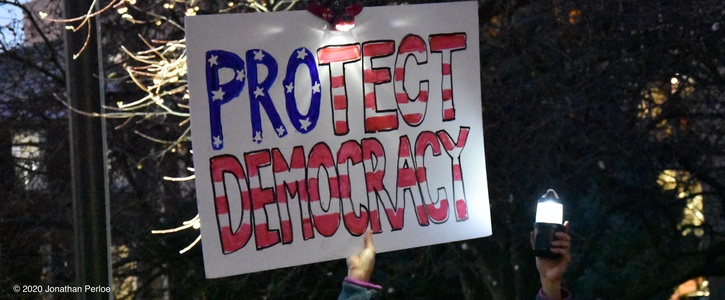50 signatures reached
To: Democratic candidates for President: Bennet, Biden, Bloomberg, Booker, Buttigieg, Delaney, Klobuchar, Patrick, Steyer, Sanders, Warren, and Yang.
Ask Democratic candidates to tell their supporters: "No matter who wins, I expect you to be all in."

At the end of every campaign rally, Democratic candidates should pledge: “Whichever candidate is nominated, I’m going to do everything I can to get them elected, working as hard as if I was the nominee. More important, I want all my supporters to do the same.”
Why is this important?
Our democracy faces an existential threat if Donald Trump is re-elected. The damage he has done during his first term, enabled by feckless Congressional Republicans who put party over country, will take years, if not decades, to undo.
Trump has already packed federal courts with right-wing ideologues; fully one in four U.S. circuit court judges have been appointed to lifetime seats by Trump. His Supreme Court picks have moved the high court to the right of ultra-conservative Justice Scalia. It's terrifying to imagine what the federal judiciary would look like after another four years of Trump nominees.
It’s expected that during the Democratic primaries candidates will attack their opponents’ platforms; at times the critiques have been mean-spirited and personal and no doubt will continue that way as the competition intensifies. Worse, though, is what’s playing out among the candidates’ core supporters. Examples abound on social media of insults being hurled at one candidate or another by the others’ supporters. That doesn’t bode well for the general election.
To defeat Trump in conservative-leaning swing states (the only ones that matter, thanks to winner-take-all and the Electoral College), to hold the Democratic House majority and to flip the Senate, Democrats will need a get-out-the-vote effort the likes of which we’ve never seen. To achieve that will require efforts well beyond what the eventual nominee will be able to muster on their own. But to listen to some activists, if their candidate doesn’t prevail, yes, they’ll vote for whomever is the Democratic nominee, but beyond that the effort they make will be much less than what it would have been. Given what’s at stake, that’s not acceptable. If the losing candidates’ supporters just show up to vote, but do no more, we could lose it all.
The only ones who can change this narrative are the candidates themselves. And they can’t wait until after the convention. Democrats can’t afford to let the acrimony between the camps build to the point that the ill will causes any Democratic activist to sit on the sidelines (the way it did in 2016 between Hillary and Bernie supporters.)
The way to build party unity is for candidates to keep sending the message to their supporters, “I expect you to work as hard to elect the Democratic nominee, whoever it is, as you will if I win the nomination. Nothing less is acceptable. Do I have your promise that you’re all in, whoever is nominated?” Imagine the power of a huge display of unity at the end of every Democratic nominee's campaign rally. We need nothing less.
Trump has already packed federal courts with right-wing ideologues; fully one in four U.S. circuit court judges have been appointed to lifetime seats by Trump. His Supreme Court picks have moved the high court to the right of ultra-conservative Justice Scalia. It's terrifying to imagine what the federal judiciary would look like after another four years of Trump nominees.
It’s expected that during the Democratic primaries candidates will attack their opponents’ platforms; at times the critiques have been mean-spirited and personal and no doubt will continue that way as the competition intensifies. Worse, though, is what’s playing out among the candidates’ core supporters. Examples abound on social media of insults being hurled at one candidate or another by the others’ supporters. That doesn’t bode well for the general election.
To defeat Trump in conservative-leaning swing states (the only ones that matter, thanks to winner-take-all and the Electoral College), to hold the Democratic House majority and to flip the Senate, Democrats will need a get-out-the-vote effort the likes of which we’ve never seen. To achieve that will require efforts well beyond what the eventual nominee will be able to muster on their own. But to listen to some activists, if their candidate doesn’t prevail, yes, they’ll vote for whomever is the Democratic nominee, but beyond that the effort they make will be much less than what it would have been. Given what’s at stake, that’s not acceptable. If the losing candidates’ supporters just show up to vote, but do no more, we could lose it all.
The only ones who can change this narrative are the candidates themselves. And they can’t wait until after the convention. Democrats can’t afford to let the acrimony between the camps build to the point that the ill will causes any Democratic activist to sit on the sidelines (the way it did in 2016 between Hillary and Bernie supporters.)
The way to build party unity is for candidates to keep sending the message to their supporters, “I expect you to work as hard to elect the Democratic nominee, whoever it is, as you will if I win the nomination. Nothing less is acceptable. Do I have your promise that you’re all in, whoever is nominated?” Imagine the power of a huge display of unity at the end of every Democratic nominee's campaign rally. We need nothing less.
How it will be delivered
Signatures will be emailed to each campaign.
